|
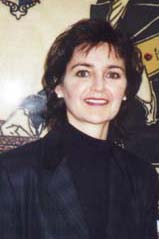 Gloria
Totoricagüena is the Secretary of International Relations
of the NABO organisation in the USA, and she is also a university
professor. After completing her thesis on the Basque dispersion,
she graduated in the London School of Economics last December
2000. The objective of such research was, by joining political
science and sociology, to examine the situation of the Basque
centres in the world, divulging the manner in which their members
maintain their ethnic personality. We have spoken to her on occasion
of her recent visit to the Basque Country. Gloria
Totoricagüena is the Secretary of International Relations
of the NABO organisation in the USA, and she is also a university
professor. After completing her thesis on the Basque dispersion,
she graduated in the London School of Economics last December
2000. The objective of such research was, by joining political
science and sociology, to examine the situation of the Basque
centres in the world, divulging the manner in which their members
maintain their ethnic personality. We have spoken to her on occasion
of her recent visit to the Basque Country.
-What
exactly is NABO?
The North American
Basque Organizations, Incorporated (NABO), was founded in 1974
with the objective to promote and preserve cultural and social
activities of the Basque people; to cultivate understanding and
friendship between Basques themselves and between Basques and
non-Basques; to educate and enlighten the public about Basque
themes; and to advance open communications between Basques in
the United States and Basques around the world. It is a service
organization to the Basque associations in the United States that
are members of this collaborative union. Before the 1970s it was
quite unusual for Basques in the American West to create exchanges
or to travel the long distances to each other’s functions. Today
because of the networks established it is not unusual for Basques
from San Francisco to drive the 12 hours to arrive for Boise’s
Jai Aldi, or for Boiseans to drive seven hours for the Reno Basque
Festival. NABO organizes Basque cultural activities, and sport
and card-playing competitions between the associations of the
United States. It functions similarly to a confederation because
it may not infringe on the autonomy of any individual Basque Center,
and these organizations can choose to participate in joint projects,
or they may completely abstain.
All
Basque organizations are self-funded and do not depend on any
public subsidy. Each creates their own fund-raisers, charges a
small fee to members, and charges participants for activities.
Basque cultural functions are well attended by the non-Basque
population throughout California, Oregon, Washington, Nevada,
Idaho, Utah, Wyoming, and New York, and the Basque Center events
are utilized as an educational tool for non-Basques. However,
as the generations are now farther away from the actual emigrant
from Euskal Herria, often the Basque Centers and clubs must educate
their own members concerning Basque topics from the homeland,
and from the host society. Many Basques in the United States do
not know anything about the history of their ancestors' emigration
from Europe, nor are they familiar with the history of Basques
in the United States.
-How many Basque
associations form NABO?
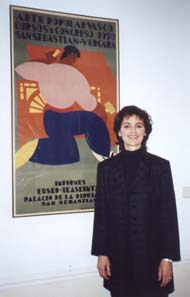 There
are currently thirty-five different Basque organizations in the
United States that are members. The Vancouver, Canada club is
also associated with NABO and its members are invited to participate
in our functions and celebrations. Each Center has its own history
and particular interests, but all share in the common goal to
preserve the Basque language and Basque culture. All have elected
Boards of Directors who serve voluntarily and various committees
of volunteers who organize dinners, dances, euskara classes,
Basque cuisine classes, choirs, dantzari taldeak, tournaments
of mus and briska, and pelota championships. There
are currently thirty-five different Basque organizations in the
United States that are members. The Vancouver, Canada club is
also associated with NABO and its members are invited to participate
in our functions and celebrations. Each Center has its own history
and particular interests, but all share in the common goal to
preserve the Basque language and Basque culture. All have elected
Boards of Directors who serve voluntarily and various committees
of volunteers who organize dinners, dances, euskara classes,
Basque cuisine classes, choirs, dantzari taldeak, tournaments
of mus and briska, and pelota championships.
-Which
are the most important activities carried out by the federation?
Its annual activities
include a "music camp" similar to the adolescent "colonias"
offered to teenagers in the Basque Country. The NABO Music Camp
program offers two weeks of instruction in Basque dancing, singing,
accordion, tambourine, mus, pelota, history, cuisine,
and language. Many of our youngsters are third or fourth generation
Basques who do not have much knowledge about Euskal Herria or
about Basque culture except to know that they are Basque by heritage.
This camp gathers Basque youth from around the United States and
gives them the opportunity to meet other Basques their own age,
to learn new information and skills that they can then take back
to their own Basque communities in order disseminate the knowledge.
The number of music camp participants varies from 40-80 and the
camps are held in the summer, rotating between different clubs
in Wyoming, Utah, Idaho, Nevada, and California. Instructors are
from the United States and Euskal Herria.
The Kantari Eguna is
held in Gardnerville, Nevada and is enjoyed by all music lovers.
Bertsolaris, choirs, and instrumental musicians participate
with pieces of original music and lyric, and also with established
Basque music. In some years there have been competitions with
prizes and in others the artists perform for exhibition.
NABO organizes an annual pelota
championship with players from the Centers in California, Idaho
and Nevada. Though several of the Centers in other States have
frontones, many are in disrepair and there are not enough
players who can practice in order to compete.
Mus tournaments are
the highlight of the year for many members with each club organizing
their own tournament to send their winners on to the NABO National
Championships. The winners of the NABO tournament then participate
in the International World Mus Tournament. The 2001 World
Mus Tournament will be held in July at the Euskal Etxea
in Boise, Idaho.
An annual calendar
project displays photography from the homeland and from events
of the United States Basques' activities. The calendar mixes French,
Spanish, Euskara, and English and notifies us of all clubs’
events, summer picnics, dances, and annual festivals. The newsletter
"Hizketa" is published three times a year and
besides giving current events information regarding NABO and individual
NABO clubs, it also educates the reader on topics of euskara,
and homeland history, anthropology, and culture.
-When
did Basque emigration to the United States commence?
Basque
emigration to the United States came from Latin America before
it came from Euskal Herria. Basques from Chile, Argentina and
Uruguay made the voyage to the Pacific coast of North America
when it was still under Mexican control (joining thousands of
others of Basque heritage who colonized Mexico). Basque clerics,
military personnel, and merchants were already present in what
is now Arizona, New Mexico, and California. Contemporary Basque
emigration began in 1848 with the annexation of California to
the United States and the gold rush of 1849. The earlier emigration
was from Nafarroa and Iparralde to California and
southern Nevada, and later, 20th century, emigration
was mainly Bizkaian to Idaho and northern Nevada and eastern Oregon.
-What is the
current situation with new immigration of Basques to the United
States? Has the flow continued, and do these new immigrants affiliate
themselves with the Basque Centers?
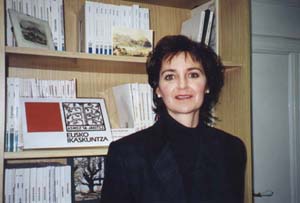 If
the new Basque immigrants do not attend events or participate
in activities, if they do not let it be known that they are from
the Basque Country and now living in City X, there is no way for
us to know they exist. There are students from Euskal Herria studying
at the thousands of universities in the country, but many of these
say they came to the U.S. to learn about American culture and
enjoy U.S. campus life, not go to the Basque Centers and play
mus with the elderly members, or endure through conversations
with people trying to practice their beginning batua. They
came for a temporary American experience and to practice English,
not to learn folk dances and practice Basque. Others are professionals
working with multinational corporations or international non-governmental
organizations and are not usually placed in small towns where
there are Basque organizations such as Bakersfield, Rock Springs,
or Elko. They do not have the opportunity to attend Basque cultural
activities or to join an association because there are none in
their city. If
the new Basque immigrants do not attend events or participate
in activities, if they do not let it be known that they are from
the Basque Country and now living in City X, there is no way for
us to know they exist. There are students from Euskal Herria studying
at the thousands of universities in the country, but many of these
say they came to the U.S. to learn about American culture and
enjoy U.S. campus life, not go to the Basque Centers and play
mus with the elderly members, or endure through conversations
with people trying to practice their beginning batua. They
came for a temporary American experience and to practice English,
not to learn folk dances and practice Basque. Others are professionals
working with multinational corporations or international non-governmental
organizations and are not usually placed in small towns where
there are Basque organizations such as Bakersfield, Rock Springs,
or Elko. They do not have the opportunity to attend Basque cultural
activities or to join an association because there are none in
their city.
-How is the
current political situation of Euskal Herria perceived from NABO's
point of view?
Though several Basques
have served as political candidates and elected officials in government,
the United States diaspora Basque Centers and organizations are
basically non-partisan and non-political. They do not affiliate
with United States political parties or allow partisan projects
to be a part of the Center's functions and they do not endorse
candidates or parties for elections, referendums, or initiatives.
However, in researching United States Basques' political opinions
and behavior, I found that many Basques crossed party lines to
vote for fellow Basques. For example: in Idaho, Pete Cenarrusa
has been elected as Secretary of State as a Republican in numerous
consecutive elections. However, many Basques who stated they normally
vote for the Democrats, admitted they vote for Mr. Cenarrusa because
he is Basque and they want him to win specifically because he
is Basque and so are they.
The politics of Euskal Herria
is a different story. Emigrant generation Basques know much more
about the actual situation because they are likely to keep in
touch with relatives regularly, they speak Basque, French, and/or
Spanish and they are able to read media reports regarding the
state of euskara in Navarra, political violence, elections
in Euskadi, etc. In general though, Basques in the United States
are not as knowledgeable or as interested in homeland politics
because the majority are economic emigrants and their descendents.
This is opposed to Venezuela or Argentina where thousands of nationalist
political refugees emigrated during, and after, the Spanish Civil
War affecting the existing Basques and their diaspora organizations.
Individual diaspora Basques
are interested in the movement for euskara, and NABO promotes
language classes in each of the member organizations. Several
clubs have Basque language classes and Boise has its own ikastola
for twenty-eight children ages 3-7. Young Basques who have visited
or lived in Euskal Herria often return to the U.S. with increased
interest in politics and the future of the seven provinces. Some
wear T-shirts advertising "Askatasuna", and "Presoak
Kalera", but few have a clear understanding of the numerous
political factors influencing the future of the Basque Country.
Elections in Euskadi have a very low turn-out from diaspora voters
eligible to participate. Those who do vote from the United States
reported they favor the PNV first, and EH second. However, the
majority report they do not know enough about homeland politics
to 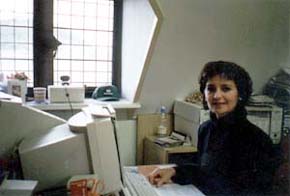 choose
a political party that represents their views. NABO Delegates
do not discuss political parties, elections, or future political
projects as a part of any meetings. It does have good relations
with the government of Euskadi and the Office of Relations with
Basque Communities Abroad in the Lehendakaritza. Several
institutions in Iparralde have relations with NABO clubs,
mostly those in California, for sending pelotaris, chefs,
language teachers, and dance instructors. There have been fewer
contacts or exchanges with institutions in Nafarroa. choose
a political party that represents their views. NABO Delegates
do not discuss political parties, elections, or future political
projects as a part of any meetings. It does have good relations
with the government of Euskadi and the Office of Relations with
Basque Communities Abroad in the Lehendakaritza. Several
institutions in Iparralde have relations with NABO clubs,
mostly those in California, for sending pelotaris, chefs,
language teachers, and dance instructors. There have been fewer
contacts or exchanges with institutions in Nafarroa.
-Do
we know exactly how many Basques live in the United States?
No, but we do have
an approximation. There are several factors that enter into the
"counting" of Basques. First of all, who "counts" as a Basque?
Only those people who consider themselves as Basques and self-identify
as Basques? Or all those with Basque surnames, whether they define
themselves as Basques or not? What about the people who have emigrated
from Mexico, the Philippines, or Cuba and whose surnames are Ochoa,
Echeverria or Navarro? Though their names signify they are Basque,
they might say they are Mexican, Filipino, or Cuban. There is
also the confusing factor that some believe a Basque is one who
is born in the Basque Country, and that descendants of homeland-born
Basque immigrants are not Basque. The Basque Studies Program (now
the Center for Basque Studies) at the University of Nevada Reno
played a significant role in modifying the United States census
of 1980 and 1990 to include a place where the survey would ask
for a person's ethnic identity, or identities. Previously respondents
were asked their "nationality" which most confused with political
states and Basques would have been classified as French or Spanish.
The 1990 Census was the second survey utilizing ethnic identity,
and not birthplace, as a category.
Because
the specific data of the 2000 Census results are not yet finished,
we can look at the 1990 Census statistics and compare it to the
1980 data. The following table shows States with more than 800
respondents reporting themselves as Basque, French-Basque, or
Spanish-Basque.
Table I. Basque
Population of the United States for 1990 and 1980
| State | Number
of Basques Counted in the United States Census |
| |
1990 |
1980 |
| 1.
California |
19,122 |
15,530 |
| 2.
Idaho |
5,587 |
4,332 |
| 3.
Nevada |
4,840 |
3,378 |
| 4.
Oregon |
2,257 |
2,253 |
| 5.
Washington |
1,770 |
1,134 |
| 6.
Utah |
1,422 |
873 |
| 7.
Arizona |
1,316 |
1,100 |
| 8.
New York |
1,300 |
1,426 |
| 9.
Texas |
1,248 |
887 |
| 10.
Florida |
1,189 |
859 |
| 11.
Colorado |
955 |
955 |
Respondents were
allowed to select up to three designations for their ethnic identity
and 78.9 percent of these Basques made it their first designation
though they might have another ethnic identity as well (Douglass
1993:7).
These data reflect
the number of people that specifically designated themselves on
the Census paper form. However in interviews I have found that
many people who do consider themselves as Basques did not mark
it on the form. Some people did not understand the question, others
did not think it important. I would argue there are many more
thousands of Basques in the United States, however, there is currently
no other manner to obtain a scientific count.
-For
an emigrant, the notion of belonging to the country that he/she
has left behind tends to dissipate with the passage of time. How
can this process be avoided?
Some sociologists have
argued that the importance of ethnic identity will lessen with
the generations- the "straight-line assimilation" theory of immigrants.
Supposedly each successive generation gets further and further
away from their ancestors' cultural ethnic behavior and traditions.
Others have argued a "third generation return" and that the culture
and traditions that the son of the emigrant wanted to forget,
the grandson wants to remember. However, in the case of Basques
in the United States, there are no data to support either of these
theories. The relatively small Basque communities (compared to
those in Argentina, Uruguay, or Venezuela) have Basques who maintain
their ethnic identity as an important part of their personalities
and personal interests through four straight generations. In other
cases, the first member of a family to be interested in manifesting
their ethnicity might be a fourth or fifth generation Basque.
Of course there are many others who do not consider their "Basqueness"
an issue for public display. Who is to judge how a person
should be Basque? If one does not participate in the Basque activities
at the Centers, should this necessarily be interpreted as assimilation?
The
number of Basque organizations in the United States is actually
increasing, as are the membership numbers of those affiliated
with Basque Centers and associations. In the 1980’s there were
twenty member clubs of NABO. In 2001 there are thirty-five clubs,
and as mentioned, not a result of new immigration.
-What
could Basques from NABO be doing in the United States to improve
the position of our small country?
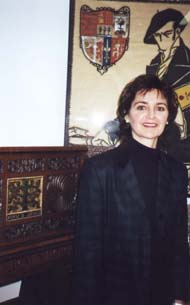 Basques
in the United States are enthusiastic about educating the public
in regards to Basque language, culture, history, and traditions.
When the Lehendakari Ardanza stated that the Basques in
the diaspora are Euskal Herria's ambassadors, he spoke a truth
with enormous yet untapped potential. The best advertising for
tourism to the Basque Country could be by diaspora Basques themselves.
Countering negative media representations of political events
in the homeland could be spread by Basques themselves educating
their friends in their communities and informing their local media
about other views of the seven provinces. Basques in the US have
also used their commercial networks to encourage investment in
the homeland and to initiate exchanges of professionals. We have
established student exchanges for homeland Basques wishing to
practice English and diaspora Basques wishing to practice their
euskara in homes and barnateguis. Individual Basques
contact their Representatives and Senators to discuss the politics
of homeland problems, though fewer and fewer understand it themselves.
While Basques in the United States (and worldwide) are unlikely
to draw attention to themselves and their work, we all need to
continue to duplicate the positive reputation our ancestors earned
by being trustworthy, honest, hard-working, and by keeping our
given word. Inside our associations, we must strengthen the work
of teaching and using euskara, encourage and maintain our
ethnic identity and cultural traditions, as well as fortify teenagers
with the dreams of traveling to Euskal Herria and knowing their
homeland. Basques
in the United States are enthusiastic about educating the public
in regards to Basque language, culture, history, and traditions.
When the Lehendakari Ardanza stated that the Basques in
the diaspora are Euskal Herria's ambassadors, he spoke a truth
with enormous yet untapped potential. The best advertising for
tourism to the Basque Country could be by diaspora Basques themselves.
Countering negative media representations of political events
in the homeland could be spread by Basques themselves educating
their friends in their communities and informing their local media
about other views of the seven provinces. Basques in the US have
also used their commercial networks to encourage investment in
the homeland and to initiate exchanges of professionals. We have
established student exchanges for homeland Basques wishing to
practice English and diaspora Basques wishing to practice their
euskara in homes and barnateguis. Individual Basques
contact their Representatives and Senators to discuss the politics
of homeland problems, though fewer and fewer understand it themselves.
While Basques in the United States (and worldwide) are unlikely
to draw attention to themselves and their work, we all need to
continue to duplicate the positive reputation our ancestors earned
by being trustworthy, honest, hard-working, and by keeping our
given word. Inside our associations, we must strengthen the work
of teaching and using euskara, encourage and maintain our
ethnic identity and cultural traditions, as well as fortify teenagers
with the dreams of traveling to Euskal Herria and knowing their
homeland.
Pictures: Josemari Velez de Mendizabal
Euskonews & Media 121.zbk
(2001 / 5 / 4-11)
|

